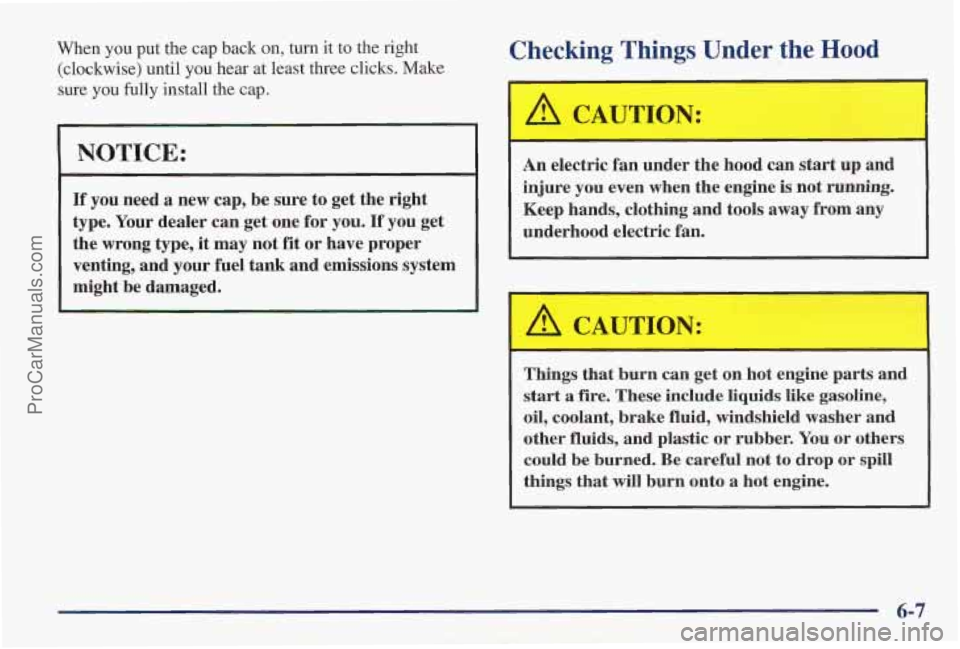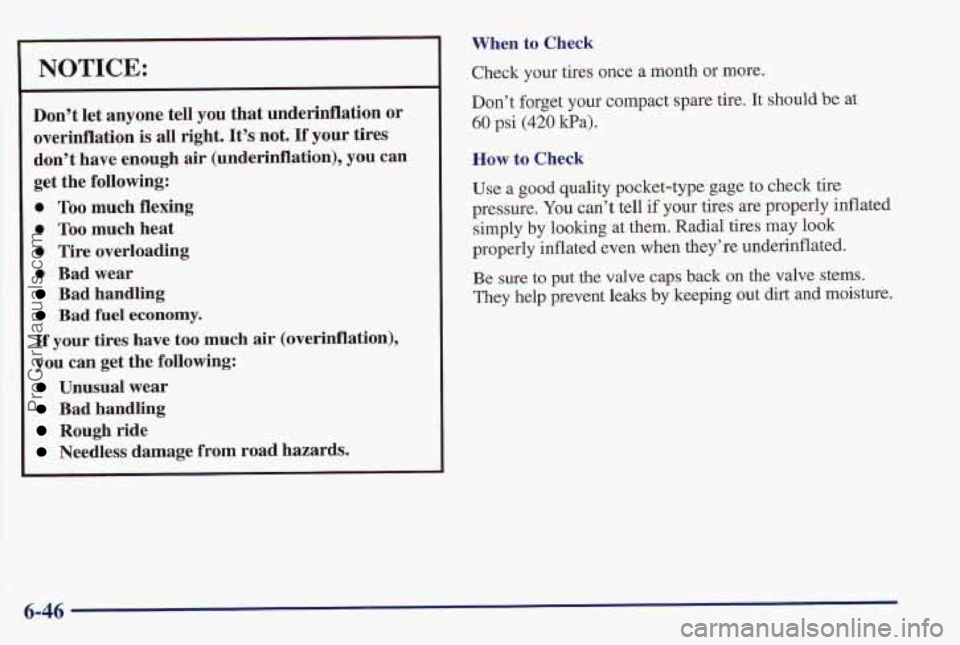1997 PONTIAC PONTIAC fuel type
[x] Cancel search: fuel typePage 271 of 419

Section 6 Service and Appearance Care
Here you will find information about the care of your Pontiac. This section begins with service and fuel information,
and then it shows how to check important fluid and lubricant levels. There
is also technical information about your
vehicle, and a part devoted to its appearance care.
6-2
6-3 6-5
6-5
6-7
6- 14
6-2 1
6-26
6-32
6-33 6-36
6-37
6-37 6-44
6-46
Doing Your Own Service Work
What Kind of Fuel to Use
Using Fuel in Foreign Countries
Where to Put the Fuel and Filling the Tank
Checking
Things Under the Hood
Checking Your Engine Oil
Automatic Transaxle Fluid
Engine Coolant
Where to Fill the Windshield Washer Fluid
Important Brake Information
Information on Your Vehicle’s Battery
Tips on Vehicle Storage
Bulb Replacement Procedures
Windshield Wiper Blade Replacement
How and When to Check Tire Inflation 6-50
6-52
6-55
6-58
6-59
6-61
6-63
6-64
6-65 6-66
6-66
6-72
6-72
6-73
6-73 When
it is Time to Buy New Tires
Wheel Alignment
Cleaning the Inside of Your Vehicle
Care of the Safety Belts and Built-in
Child Restraint
Cleaning the Outside of Your Vehicle
How to Clean Aluminum Wheels
Underbody Maintenance
Recommended Appearance
Care Materials
Your Vehicle Identification Number (VIN)
The Electrical System
Fuses and Circuit Breakers
Replacement Bulb Types for Your Vehicle
Capacities and Specifications
Air Conditioning Specifications
Normal Replacement Parts
ProCarManuals.com
Page 274 of 419

If your vehicle is certified to meet California Emission
Standards (indicated on the underhood tune-up label),
it
is designed to operate on fuels that meet California
specifications. If such fuels
are not available in states
adopting California emissions standards, your vehicle
will operate satisfactorily on fuels
meeting federal
specifications, but emission control system performance
may be affected. The malfunction indicator lamp
on
your instrument panel may turn on and/or your vehicle
may fail a smog-check test.
If this occurs, return to your
authorized Pontiac dealer for diagnosis to determine
the
cause of failure. In the event it is determined that the
cause of
the condition is the type of fuels used, repairs
may not be covered by your warranty.
Some gasolines that
are not reformulated for low
emissions contain an octane-enhancing additive called
methylcyclopentadlenyl manganese tricarbonyl (MMT); ask your service station operator whether or not his fuel
contains
MMT. General Motors does not recommend the
use of such gasolines. If fuels containing MMT are used,
spark plug life may be reduced and your ernissicrn
control
system performance may be affected. The
malfunction indicator lamp
on your instrument panel
may
turn on. If this occurs, return to your authorized
Pontiac dealer
€or service.
To provide cleaner ais, all gasolines in the United States
are now required to contain additives that will help
prevent deposits
from forming in your engine and fuel
system, allowing your emission control system to
function properly. Therefore,
you should not have to add
anything to the
fuel. In addition, gasolines containing
oxygenates, such as ethers and ethanol, and
reforrnulate'd gasolines may
be available in your area to
help clean the air. General Motors recommends that you
use these gasolines
if they comply with the
specifications described earlier.
~~
NOTICE:
Your vehicle was not designed for fuel that
contains methanol. Don't use it. It
can corrode
metal parts in
your fuel system and also damage
plastic and
rubber parts. That damage wouldn't
be covered under
your warranty.
_____~~
6-4
ProCarManuals.com
Page 277 of 419

When you put the cap back on, turn it to the right
(clockwise) until you hear at least three clicks. Make
sure you fully install the cap.
NOTICE:
If you need a new cap, be sure to get the right
type. Your dealer can get one for you.
If you get
the wrong type, it may not
fit or have proper
venting, and your fuel tank and emissions system
might be damaged.
Checking Things Under the Hood
A CAUTION:
An electric fan under the hood can start up and
injure you even when the engine is not running.
Keep hands, clothing and tools
away from any
underhood electric fan.
Things that burn can get on hot engine parts and
start
a fire. These include liquids like gasoline,
oil, coolant, brake fluid, windshield washer and
other fluids, and plastic
or rubber. You or others
could
be burned. Be careful not to drop or spill
things that will burn onto
a hot engine.
6-7
ProCarManuals.com
Page 316 of 419

I NOTICE:
Don't let anyone tell you that underinflation or
overinflation is all right. It's not.
If your tires
don't have enough air (underinflation), you can
get the following:
0 Too much flexing
0 Too much heat
0 Tire overloading
0 Bad wear
Bad handling
Bad fuel economy.
If your tires have too much air (overinflation),
you can get the following:
Unusual wear
Bad handling
Rough ride
Needless damage from road hazards. When
to Check
Check your tires once a month
or more.
Don't forget your compact spare tire. It should
be at
60 psi (420 kPa).
How to Check
Use a good quality pocket-type gage to check tire
pressure. You can't tell if your tires
are properly inflated
simply
by looking at them, Radial tires may look
properly inflated even when they're underinflated.
Be sure to put the valve caps back on the valve stems.
They help prevent leaks
by keeping out dirt and moisture.
6-46
ProCarManuals.com
Page 342 of 419

Replacement Bulbs
Exterior Lamps Bulb Number
Back-up ............................... 3 156
Center High-Mounted Stop
................ 1141
Front Parking/Turn Signal
.............. .3357NA
Headlamps ............................. 9007
Stop/Tail/Turn Signal ..................... 3057
Front/Rear Side Marker .................... 194
Capacities and Specifications
Please refer to “Recommended Fluids and Lubricants”
in the Index for more information.
Automatic Transaxle with Overdrive .
Pan Removal and Replacement ... 7.4 quarts (7.0 L)
After Complete Overhaul ......... 10 quarts (9.5 L)
When drainingheplucing converter or auxiliary coolel;
more fluid may be needed,
Cooling System Including Reservoir
3100 (Code M) .............. 11.0 quarts (10.42 L)
3800 (Code K) .............. 10.2 quarts (9.63 L)
3800 Supercharged (Code 1) ... 10.2 quarts (9.63 L)
Refrigerunt (R- 134a),
Air Conditioning” ............. 1.9 pounds (0.85 kg)
Engine Crankcase (Oil Change with Filter Change)
3 100 (Code M) ................ 4.5 quarts (4.3 L)
3800 (Code K) ................ 4.5 quarts (4.3 L)
3800 Supercharged (Code 1) ....... 5 quarts (4.7 L)
Fuel Tank ................. 18.0 gallons (68.0 L)
*See “Air Conditioning Refrigerants ’’ later in this section.
3100 (Code M) Engine Specifications
Type .................................... V6
Displacement ............... 191 CID (3.1L L82)
Firing Order ...................... 1-2-3-4-5-6
Thermostat Temperature
........... 195°F (91°C)
Horsepower
............................. 160
3800 (Code K) Engine Specifications
Type .................................... V4
Displacement ............... 231 CID (3.8L L36)
Firing Order ...................... 1-6-5-4-3-2
Thermostat Temperature
........... 195°F (91°C)
Horsepower ................ ......... 195
6-72
ProCarManuals.com
Page 399 of 419

We will provide the following services for
3 year/36,000 miles (60 000 km), at no expense to you:
Fuel delivery
Keys locked in vehicle
0 Tow to nearest dealership for warranty service
Change a flat tire
Jump starts
Courtesy Transportation -- See Pontiac Courtesy
Transportation section for details
We have quick, easy access
to telephone numbers of the
following additional services depending on vour needs:
Hotels
Glass replacement
Rental vehicle or taxis
Police, fire department or hospitals
In many instances, mechanical failures are covered
under Pontiac’s comprehensive warranty. However,
when other services are utilized, our advisors will
explain any payment obligations you might incur. For
prompt and efficient assistance when calling, please
provide the following information to give the advisor:
Location of vehicle
Telephone number of your location
Vehicle model, year and color
0 Mileage of vehicle
0 Vehicle Identification Number (VIN)
Vehicle license plate number
Pontiac reserves the right to limit services or
reimbursement to an owner or driver when in Pontiac’s
judgement the claims become excessive in frequency
or
type of occurrence.
While we hope that you never have
the occasion to use
our service, it is added security while traveling for you
and your family. Remember, we’re only a phone call
away. Pontiac Roadside Assistance
-- 1 -800-ROADSIDD
or 1-800-762-3743.
8-7
ProCarManuals.com